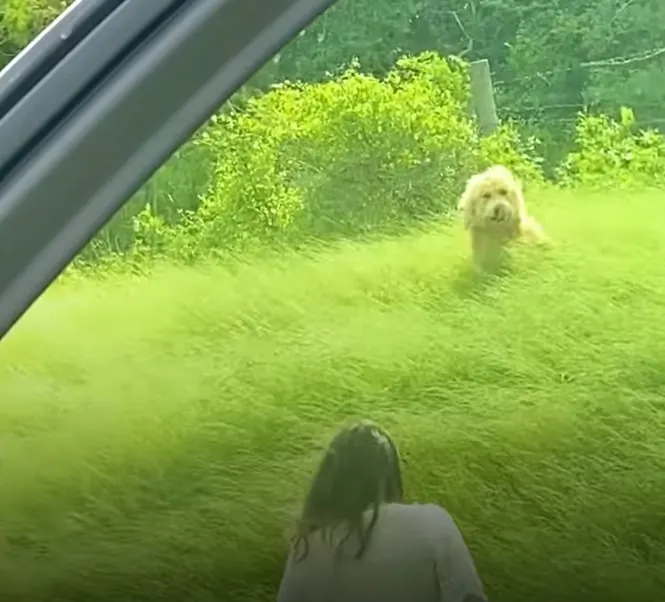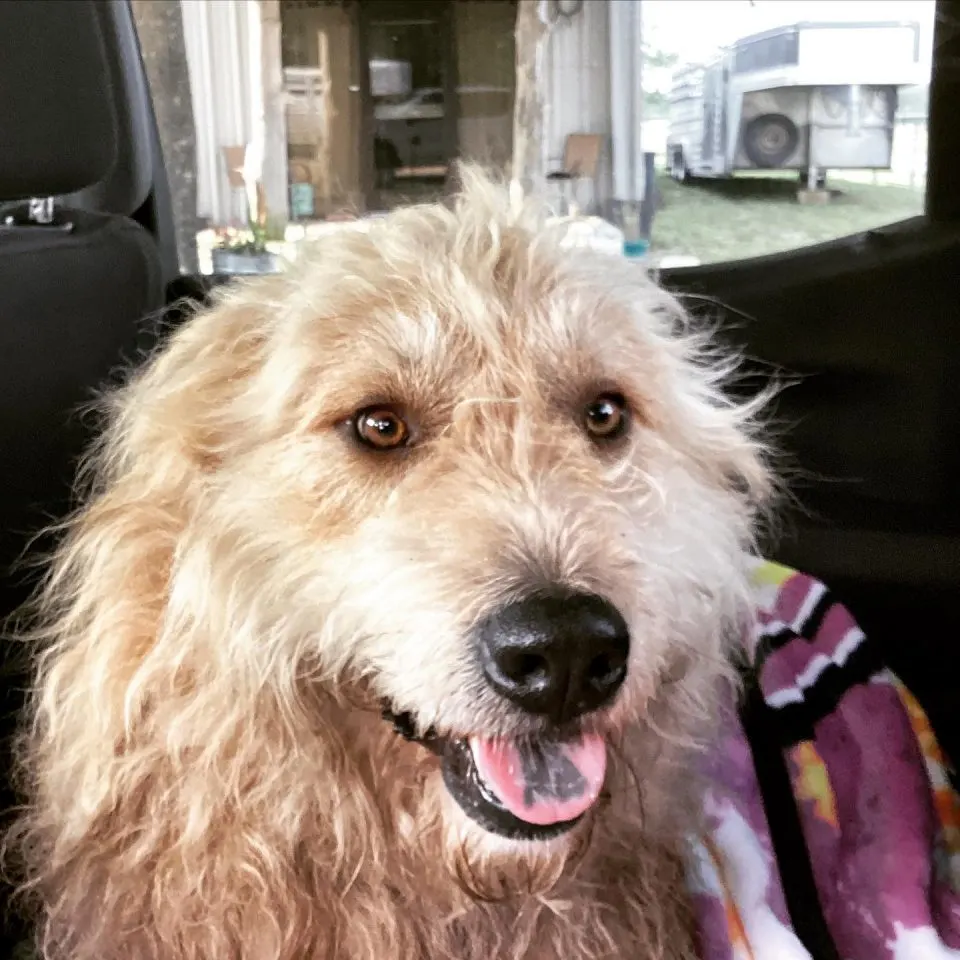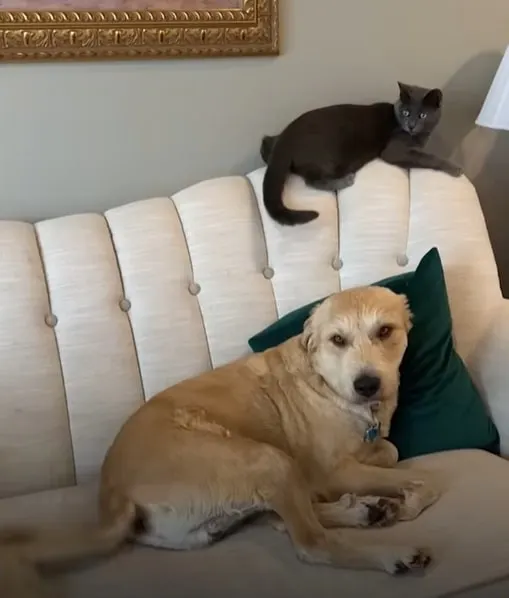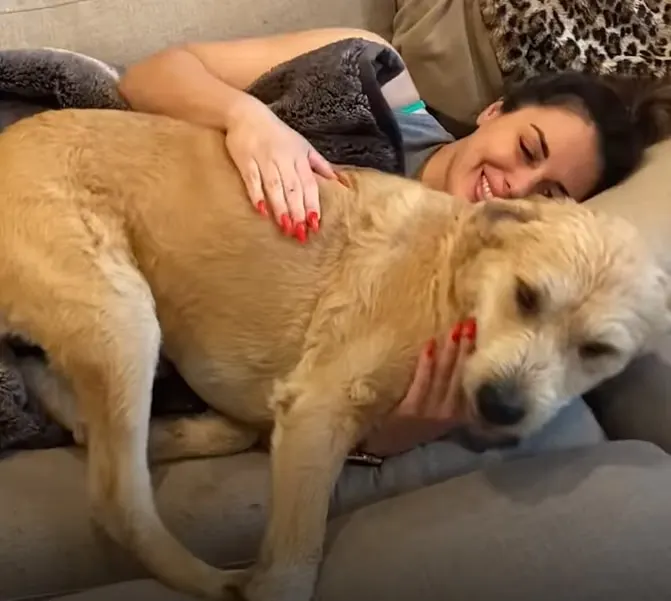Sometimes, all it takes is one good deed to make someone’s life better. And, the most amazing thing is – it makes you feel good, too!
A dog named Murphy who was just a stray back then is proof that those little parts of the machine called destiny work constantly, making sure you end up exactly where you’re supposed to be!
Carla and Laura, two sisters from Detroit, Michigan, took their family on a trip to Texas when Murphy showed up on the roadside. Filthy, matted, but full of hope – he was sitting peacefully in the grass, looking for someone to find him! Until it finally happened!
Murphy Didn’t Have A Collar

As soon as they spotted him, Laura and Carla pulled over. They both jumped out of the car and approached this sweet boy. At first, they thought he’d be timid, or maybe aggressive, but this cute, golden creature didn’t display any discomfort or displeasure for being petted.

He was all alone in this world, sitting in the grass with no one around him. It was clear that he was a stray, as his fur was very dirty, long, and messy, and he didn’t have a collar on his neck.
As he followed the sisters back to their car, they knew – this doggo had to be rescued! They decided to take him with them to Michigan, and even though it was a long trip ahead of them, they strongly believed that making Murphy a member of their family was just meant to be!
The kids were thrilled to have another road-trip buddy in their car! The journey was long and exhausting, but from that moment on – everything was bursting with excitement!
He Was A Little Shy At First
The first thing Carla and Laura had to do was bathe Murphy. His fur was so long and so dirty that the vet couldn’t examine him. His first bath ever took more than four hours, but after that – Murphy was a brand new boy!

He was a little shy at first in his new, Michigan home.
The family was big, and he wasn’t the only pawesome boy in it, so he needed a little time to adapt. But, with the treatment he received from everybody – adapting to his new life was probably the easiest part of his life journey so far!
Everyone was so excited and happy that Murphy was around, especially because Carla lost one of her dogs days before she found Murphy.
Everybody’s Welcome In Murphy’s New Home

In just a few short days, Murphy became the cutest Michigan boy ever! He soon embraced his new furry buddies and his feline friend, and they all reciprocated!
Now, everyone wants a piece of Murphy’s affection, and he doesn’t have a problem with that! His heart is big enough for everybody, and you just can’t tell who his favourite hooman in the family is! Murphy loves them all!
Ever caught your furry friend munching on something they shouldn’t be? Well, one of the most baffling behaviors that dog owners often encounter is their canine companion’s penchant for eating poop. It’s a head-scratcher, isn’t it? You’re left wondering why on earth your beloved pup would indulge in such a repulsive habit. But fret not, there’s more to this peculiar behavior than meets the eye.
As a seasoned dog trainer, you’ve probably witnessed this curious phenomenon firsthand and pondered the reasons behind it. Dogs eating poop, also known as coprophagia, can leave you feeling a mix of confusion and concern. But fear not, we’re here to shed some light on this intriguing canine behavior. So, grab a treat (for you, not your pup) and let’s unravel the mystery behind why dogs engage in this less-than-appetizing habit.
Understanding Coprophagia: Why Dogs Eat Poop
Reasons Behind Canine Coprophagia
Dogs may eat poop due to scavenging instincts from their ancestors who consumed feces to hide their presence from predators. It could also be a remnant of resource-guarding behavior where dogs eat feces to keep their living area clean. Additionally, dogs may eat poop to seek attention from their owners, especially if scolded for defecating indoors.
The Role of Diet and Nutrition
A diet lacking essential nutrients can lead to coprophagia in dogs. If a dog’s food is not providing enough nutrition, they may try to meet their needs by eating poop. Dogs fed low-quality diets or inadequate amounts of food might resort to this behavior as well. Ensuring your dog’s diet is balanced and nutritious can help prevent coprophagia.
Behavioral and Instinctual Factors
Behavioral issues such as anxiety, boredom, or stress can drive dogs to eat feces. Dogs left alone for long periods without mental stimulation may develop coprophagia out of boredom. Additionally, stress or anxiety can manifest in various behaviors, including eating poop. It’s essential to address any underlying behavioral issues through training, exercise, and mental enrichment to discourage coprophagia in dogs.
Health Risks Associated with Poop Eating in Dogs
Parasites and Diseases
Eating poop can expose your furry friend to various parasites and diseases. Feces may contain harmful bacteria like Salmonella and E. coli, along with parasites such as roundworms, hookworms, and tapeworms. When dogs consume poop, they also ingest the eggs of these parasites, putting them at risk of developing infections. These parasites can lead to symptoms like diarrhea, vomiting, weight loss, and in severe cases, even more serious health issues.
Preventing Potential Health Issues
To prevent your dog from facing health risks associated with coprophagia, it’s essential to take proactive measures. Keep your dog’s living environment clean to minimize exposure to feces. Ensure your dog’s diet is well-balanced and nutritious, providing all the essential vitamins and minerals they need. Supervise your dog during walks and playtime to prevent them from consuming feces. If you notice this behavior, redirect their focus and seek guidance from a veterinarian to address any underlying health or behavioral issues promptly. By taking these preventive steps, you can help safeguard your dog’s health and well-being.
Strategies to Discourage Poop Eating in Dogs
Training and Behavior Modification Techniques
To discourage poop eating in your dog, it’s essential to focus on training and behavior modification. Start by teaching the “Leave It” command. When your dog shows interest in feces, use this command, and reward them with a treat when they obey. Consistency is key – practice this command during walks and in various settings to reinforce the behavior. Additionally, redirect your dog’s attention by offering a toy or engaging them in play when you notice them sniffing around feces. Positive reinforcement and redirecting their focus can help deter this behavior over time.
Dietary Adjustments and Supplements
Consider adjusting your dog’s diet to deter them from eating feces. Ensure your dog is on a high-quality, balanced diet that meets all their nutritional needs. Sometimes, poop eating can be a sign of a nutrient deficiency. Speak to your veterinarian about potential dietary changes or supplements that might help curb this behavior. Adding pineapple or pumpkin to your dog’s food may make their feces less appealing. Always consult with your vet before making any significant dietary changes.
Environmental Management and Supervision
Creating a clean and well-maintained environment is crucial in discouraging poop eating. Regularly clean your yard, litter boxes, and any areas your dog frequents to remove tempting feces. When out on walks, keep your dog on a leash and closely supervise them to prevent them from consuming feces. Offer plenty of engaging toys, playtime, and mental stimulation to alleviate boredom, which can be a trigger for coprophagia. Remember, a well-supervised and enriched environment can help prevent your dog from engaging in this behavior.
When to Consult a Veterinarian
Identifying Red Flags in Your Dog’s Behavior
If you notice persistent coprophagia despite trying various prevention strategies, it might be time to consult a veterinarian. Uncontrollable eating of feces can indicate underlying health issues that need professional attention. Additionally, if your dog shows signs of distress, illness, or changes in behavior along with poop eating, a vet visit is advisable. Look out for symptoms such as vomiting, diarrhea, lethargy, weight loss, or anything unusual in your furry friend’s demeanor.
Medical Interventions and Treatments
When conventional methods fail to deter your dog from consuming poop, seeking medical interventions from a veterinarian becomes crucial. Your vet can conduct a thorough examination to rule out any health conditions triggering the behavior. Depending on the diagnosis, they may recommend specific treatments, medications, or dietary supplements to address the root cause of coprophagia. In some cases, behavioral therapy or specialized training programs might also be suggested to modify your dog’s behavior effectively.
Conclusion
So, there you have it – the reasons why your furry friend might have a poop-eating habit. From ancestral instincts to diet deficiencies, there are various factors at play. Remember, training and mental stimulation are key in curbing this behavior. If your pup’s poop-eating persists, don’t hesitate to reach out to your vet. They can help identify any underlying health issues and recommend the right course of action. With a bit of patience and the right approach, you can tackle coprophagia head-on and ensure your dog stays happy and healthy.
Frequently Asked Questions
Why do dogs eat feces?
Dogs may consume feces due to ancestral instincts, resource-guarding behavior, attention-seeking, diet deficiencies, anxiety, or boredom.
What are the risks of coprophagia?
Health risks of coprophagia include exposure to parasites and diseases present in feces.
When should I consult a veterinarian?
Consult a veterinarian if coprophagia persists, especially if accompanied by distress or changes in behavior.
What interventions can help with coprophagia?
Veterinary interventions may include examinations to identify underlying health issues, specific treatments, medications, dietary supplements, and behavioral therapy.
[no_toc]

Hey there, I’m Janet Brooks, a dog-loving student from California. I’m all about helping pups in need, especially those without homes. Me and my awesome friends work together to give shelter and love to stray dogs. Oh, and I also write blogs about dogs to share helpful info.